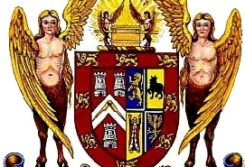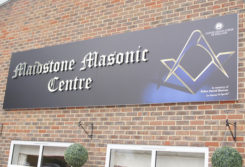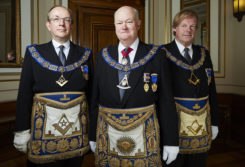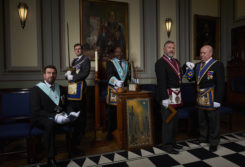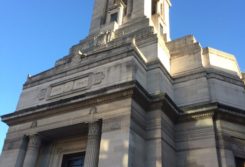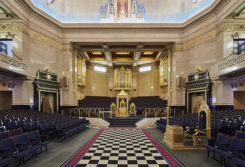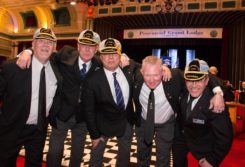Some frequently asked questions about Freemasonry
What is Freemasonry?
Freemasonry is the oldest and the largest of the secular (that is, non-religious) fraternal societies. It exists to allow men with a social conscience to put something back into society by providing aid, support and hope to those in need. Freemasons support a wide range of charitable causes dealing with everything from major international emergencies such as earthquakes or flooding, to local community causes, and individual problems such as ageing, illness or poverty.
Where and when did Freemasonry start?
No one actually knows. No documented evidence has been found to support the existence of Freemasonry as we know it, prior to October 1646 when the diary of Elias Ashmole (the founder of the Ashmolean Library in Oxford) records his admission into a Lodge of Freemasons in Warrington, Lancashire. The United Grand Lodge of England was founded in London in 1717. Whatever its exact origin, Freemasonry has a long and rich historical tradition extending back almost 400 years.
What goes on in a Lodge Meeting?
There are three ‘degree ceremonies’ performed during masonic meetings. They are essentially one act plays and teach members how to be better people and each play represents a different stage in life.
As an ‘initiate’ or Entered Apprentice, Freemasons are taught we are all born equal, we learn that in life some do better than others and it is up to those that do well to look after the less fortunate. From this stems our belief in the importance of Service.
The next stage is to become a ‘Fellow Craft’ where Freemasons are taught the importance of improving yourself as a person, and finally as a ‘Master Mason’, where we learn that we have but one life, and the importance of using it wisely.
The details of the ceremonies can easily be accessed online but nothing beats experiencing it for yourself.
After the meetings members dine together informally in order to enjoy good food, good wine, and good company. And most importantly, to have fun together.
Why do you roll your trousers up?
The honest answer is that nobody really knows for sure. There are many opinions within (and outside) Freemasonry as to the reason, but all we do know that it is one of those traditions whose true origins have been lost over time. It is currently thought that it originated in the practice of Medieval Stonemasons who were required to show that they were healthy and fit for work and that they were “Free” men. The only time a Freemason is required to bare his knee is during his progression through each of the three Degree Ceremonies which introduce him to different aspects of Masonic philosophy.
Why can’t Women become Freemasons?
Actually they can! There are two women’s Freemasonry Grand Lodges in the UK that, (apart from the obvious difference) are acknowledged to be “regular” in their practice of Freemasonry. They are: The Honourable Fraternity of Ancient Freemasons and The Order of Women Freemasons. The United Grand Lodge of England maintains a friendly informal relationship with these two organisations, liaises on matters of mutual concern, and regularly refers queries regarding women’s Freemasonry to them.
There are some parts of the world which have “co-Masonry”, admitting men and women to the same Lodges, but these are not recognised either by the United Grand Lodge of England or by the two organisations mentioned above.
In this day, single-sex organisations are very rare, but both Women and Men agree that their Freemasonry offers special and unique opportunities for socialising.
Is it expensive to be a Freemason?
There are some costs in the first year, such as joining and initiation fees, and the cost of regalia. Overall, this might total around £300 or so. You would also need a dark lounge suit. After that, the costs would be annual membership fees, which vary from Lodge to Lodge, the costs of dining, together with charity collections and so on. Overall the total might average out at between £5 and £10 per week.
Can anyone become a Freemason?
Freemasonry is a multi-faith, multi-cultural, multi-racial organisation. It is open to all men who are over 21, law abiding, of good character, and who believe in a Supreme Being. We will only accept men who fulfil all of those four essential requirements. Read more…
If I do join, what’s in it for me?
You will find it a worthwhile and fascinating way to invest some of your spare time. For most, it provides a sense of belonging to an organisation which provides a structured and formal part of life, which many feel is missing in today’s world. In addition the Lodge’s social programme offers numerous opportunities for socialising; allowing you to form new friendships that will last a lifetime.




